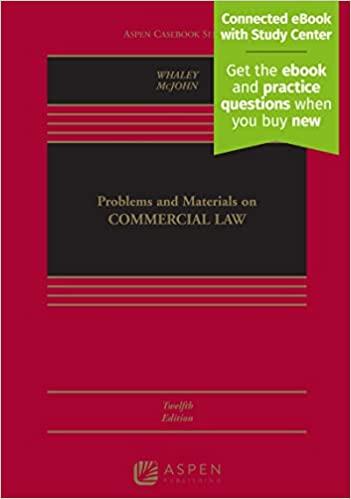Question
This is hypothetical case. This is all information provided, and I am curious as to what legal arguments could be made by the Defense in
This is hypothetical case. This is all information provided, and I am curious as to what legal arguments could be made by the Defense in support of the ICWA. Please argue the defendants perspectives on this case - especially with prior court trials relative to that of the Constitution.
State child-custody proceedings generally are governed by state law, with placement decisions based on the child's best interests. The Indian Child Welfare Act of 1978 ("ICWA"), 25 U.S.C. 1901-1963, however, dictates that, in any custody proceeding "under State law" involving an "Indian child," "preference shall be given" to placing the child with "(1) a member of the child's extended family; (2) other members of the Indian child's tribe; or (3) other Indian families" rather than with non-Indian adoptive parents. Id. 1915(a); see also id. 1915(b). The en banc Fifth Circuit fractured over the constitutionality of the placement preferences, affirming in part the lower court's decision striking them down as unconstitutional.
The questions presented is whether ICWA's placement preferences which disfavor non-Indian adoptive families in child placement proceedings involving an "Indian child" and thereby disadvantage those childrendiscriminate on the basis of race in violation of the U.S. Constitution.The plaintiffs in the case are non-Indian families who dispute the constitutionality of ICWA. They were joined by the states of Texas, Indiana and Louisiana in seeking to strike down the law as one based on "race" rather than the legal and political relationship between tribal nations and the United States.The defendants are officials at Department of the Interior and the
Department of Health and Human Services (collectively The Federal Government). The Cherokee Nation, the Morongo Band of Mission Indians, the Oneida Nation and the Quinault Nation later intervened to defend the legality of ICWA. The Navajo Nation joined the case as well, on the side of the federal defendants. Twenty-six other states, which comprise 94% of the US Native American population and 69% of the indigenous population, have filed briefs siding with the federal government and the tribal nations in support of the ICWA.
The first decision in the case was issued in October 2018. Judge Reed O'Connor, who was nominated to the bench by George W. Bush, struck down ICWA as unconstitutional because he said its provisions treat Indian children differently based on "race."
The federal government and the tribes appealed. In August 2019, a panel of three judges on the 5th Circuit largely upheld the legality of ICWA.
Facts of the Case:
The Smiths live in Minnesota and seek to adopt Child X, whose maternal grandmother is a registered member of the White Earth Band of Ojibwe Tribe (the "White Earth Band"). Child X is a member of the White Earth Band for purposes of ICWA's application in the Minnesota state court proceedings (a member of a tribe or eligible to be). Pursuant to 1915's placement preferences, county officials removed Child X from the Smiths' custody and, in January 2018, placed her in the care of her maternal grandmother, whose foster license had been revoked. Child X's guardian ad item supports the Smiths' efforts to adopt her and agrees that the adoption is in Child X's best interest. The Smiths and Child X remain separated, and the Smiths face heightened legal barriers to adopting her. On January 17, 2019, the Minnesota court denied the Smiths' motion for adoptive placement
Step by Step Solution
There are 3 Steps involved in it
Step: 1

Get Instant Access to Expert-Tailored Solutions
See step-by-step solutions with expert insights and AI powered tools for academic success
Step: 2

Step: 3

Ace Your Homework with AI
Get the answers you need in no time with our AI-driven, step-by-step assistance
Get Started


